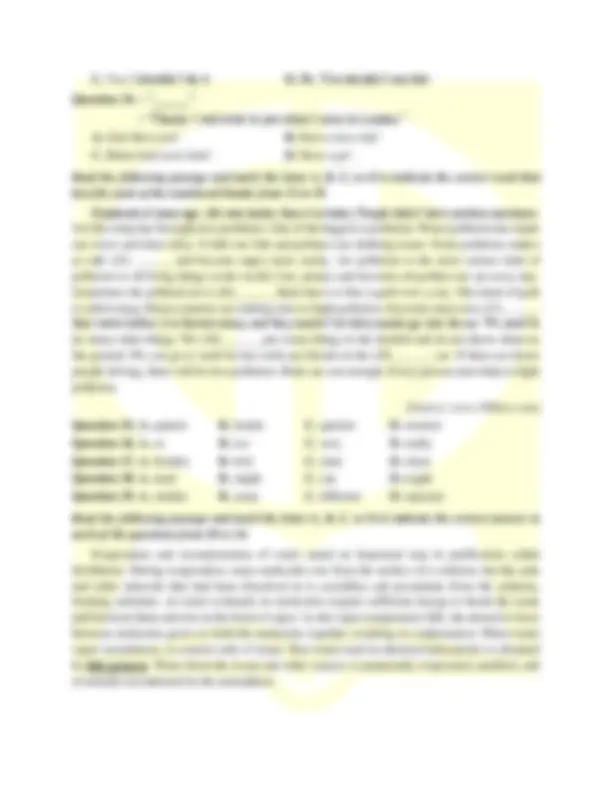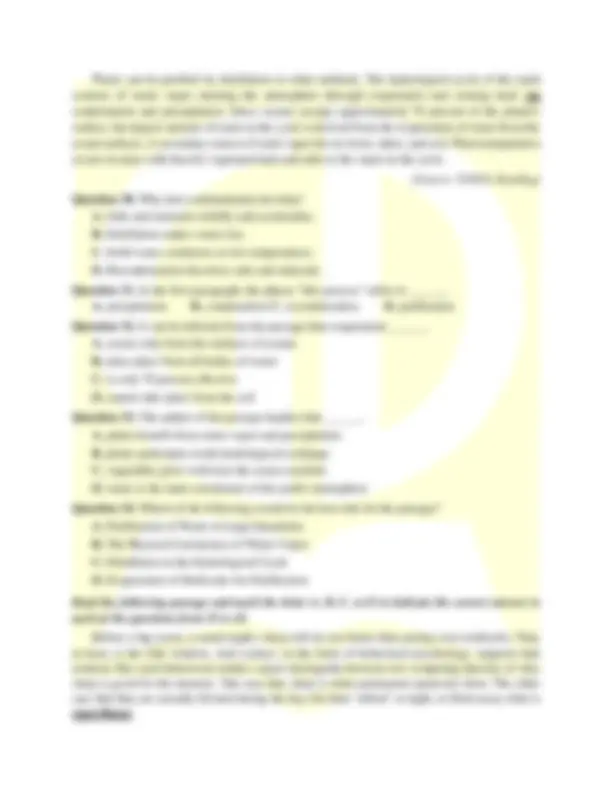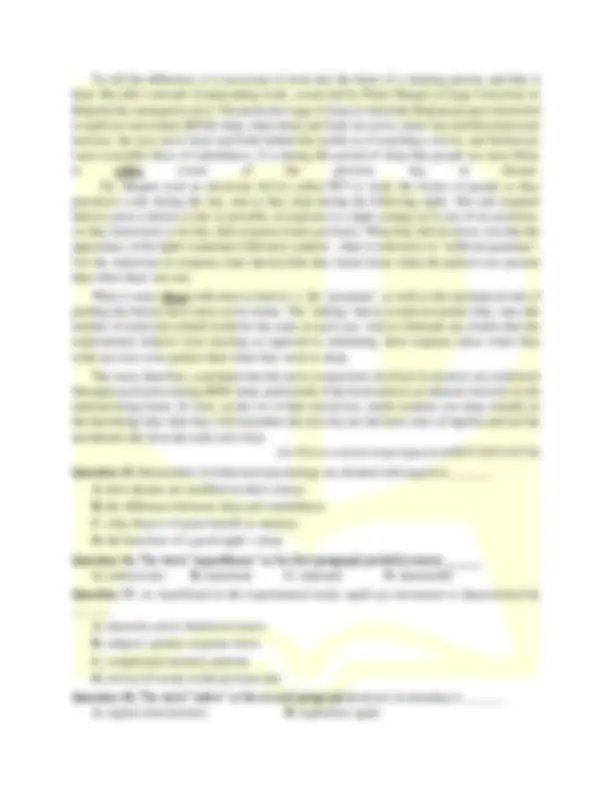





Study with the several resources on Docsity

Earn points by helping other students or get them with a premium plan


Prepare for your exams
Study with the several resources on Docsity

Earn points to download
Earn points by helping other students or get them with a premium plan
Community
Ask the community for help and clear up your study doubts
Discover the best universities in your country according to Docsity users
Free resources
Download our free guides on studying techniques, anxiety management strategies, and thesis advice from Docsity tutors
bọn này bịp vãi, đăng 2 files rồi
Typology: Exercises
1 / 7

This page cannot be seen from the preview
Don't miss anything!




Time allotted: 60 min. Mark the letter A, B, C, or D to indicate the word that differs from the other three in the position of the primary stress in each of the following questions. Question 1. A. sincerity B. remarkable C. curricula D. photocopy Question 2. A. impulsive B. concerning C. suffragette D. inspiring Mark the letter A, B, C, or D to indicate the word whose underlined part differs from the other three in pronunciation in each of the following questions. Question 3. A. official B. entice C. privilege D. prestigious Question 4. A. throne B. directory C. utmost D. lotus Mark the letter A, B, C or D to indicate the correct answer to each of the following questions. Question 5. He doesn’t write to his parents as often as he ______. A. used to B. was to C. got used to D. had to Question 6. He ______ in the doorway in order to light his cigarette. A. arrested B. entered C. paused D. hesitated Question 7. It is worthwhile ______ those old bits of string because they could be of some use later. A. to keep B. kept C. keeping D. to have kept Question 8. Who do you think I ______ in the library this morning? A. run off B. went over C. chased after D. bumped into Question 9. The weather was ______ the exceptionally poor harvest. A. blamed for B. condemned for C. accused of D. criticized for Question 10. An image on a national flag can symbolize political ideals that would ______ take many words to express. A. otherwise B. instead C. accordingly D. thus Question 11. You ______ me, because I didn’t say that. A. must be misunderstanding B. must have misunderstood C. must misunderstand D. had to misunderstand Question 12. Desert soil is ______ without water: the soil becomes very dry and cannot produce healthy plants. A. producing B. unproducing C. productive D. unproductive Question 13. Viet Nam is one of the countries which are very rich in cultural ______. A. advantage B. heritage C. vestige D. trace Question 14. – “My dad will be here tomorrow.”
Question 15. ______ calculations have shown that the earth's resources may run out before the end of this century. A. Raw B. Rude C. Crude D. Blunt Question 16. Despite playing under strength, the village team ______ beat their rivals. A. were able to B. could C. couldn’t D. weren’t able to Question 17. I had no sooner checked into the hotel ______. A. when two gunmen ordered me to open my briefcase B. than he arrived with the appropriate documents C. a young lady approached me with a smile D. before all rooms have been reserved Question 18. One of the most effective ways of getting ahead in life ______. A. you work hard and regularly B. having invested in personal relationships C. know how to solve problems quickly D. is to be a trustworthy person Mark the letter A, B, C or D to indicate the word(s) CLOSEST in meaning to the underlined word(s) in each of the following questions. Question 19. Computer criminals can access private information by illegally entering a computer system. A. approach and accept B. abandon and forget C. discuss and understand D. discover and use Question 20. She nearly freaked out when she saw the colour of her hair. It was a disaster! A. panicked B. fainted C. cheered D. approved Mark the letter A, B, C or D to indicate the word(s) OPPOSITE in meaning to the underlined word(s) in each of the following questions. Question 21. He had never experienced such discourtesy towards the president as it occurred at the annual meeting in May. It was a terrible shame. A. encouragement B. rudeness C. politeness D. measurement Question 22. The countryside of Yorkshire is a wonderful landscape of dales and moors, with many historic monuments. A. invaluable B. insignificant C. irrelevant D. uncountable Mark the letter A, B, C, or D to indicate the option that best completes each of the following exchanges. Question 23. – “I think you should not stay out so late at night.”
Water can be purified by distillation or other methods. The hydrological cycle of the earth consists of water vapor entering the atmosphere through evaporation and coming back via condensation and precipitation. Since oceans occupy approximately 70 percent of the planet's surface, the largest amount of water in the cycle is derived from the evaporation of water from the ocean surfaces. A secondary source of water vapor lies in rivers, lakes, and soil. Plant transpiration occurs in areas with heavily vegetated land and adds to the vapor in the cycle. (Source: TOEFL Reading) Question 30. Why does sedimentation develop? A. Salts and minerals solidify and accumulate. B. Distillation makes water rise. C. Solid water condenses at low temperatures. D. Recondensation dissolves salts and minerals. Question 31. In the first paragraph, the phrase "this process" refers to ______. A. precipitation B. condensation C. recondensation D. purification Question 32. It can be inferred from the passage that evaporation ______. A. occurs only from the surfaces of oceans B. takes place from all bodies of water C. is only 70 percent effective D. cannot take place from the soil Question 33. The author of the passage implies that ______. A. plants benefit from water vapor and precipitation B. plants participate in the hydrological exchange C. vegetables grow well near the ocean coastline D. water is the main constituent of the earth's atmosphere Question 34. Which of the following would be the best title for the passage? A. Purification of Water in Large Quantities B. The Physical Consistency of Water Vapor C. Distillation in the Hydrological Cycle D. Evaporation of Molecules for Purification Read the following passage and mark the letter A, B, C, or D to indicate the correct answer to each of the questions from 35 to 42. Before a big exam, a sound night's sleep will do you better than poring over textbooks. That, at least, is the folk wisdom. And science, in the form of behavioral psychology, supports that wisdom. But such behavioral studies cannot distinguish between two competing theories of why sleep is good for the memory. One says that sleep is when permanent memories form. The other says that they are actually formed during the day, but then "edited" at night, to flush away what is superfluous.
To tell the difference, it is necessary to look into the brain of a sleeping person, and that is hard. But after a decade of painstaking work, a team led by Pierre Maquet at Liege University in Belgium has managed to do it. The particular stage of sleep in which the Belgian group is interested is rapid eye movement (REM) sleep, when brain and body are active, heart rate and blood pressure increase, the eyes move back and forth behind the eyelids as if watching a movie, and brainwave traces resemble those of wakefulness. It is during this period of sleep that people are most likely to relive events of the previous day in dreams. Dr. Maquet used an electronic device called PET to study the brains of people as they practiced a task during the day, and as they slept during the following night. The task required them to press a button as fast as possible, in response to a light coming on in one of six positions. As they learnt how to do this, their response times got faster. What they did not know was that the appearance of the lights sometimes followed a pattern - what is referred to as "artificial grammar". Yet the reductions in response time showed that they learnt faster when the pattern was present than when there was not. What is more, those with more to learn (i. e. the "grammar", as well as the mechanical task of pushing the button) have more active brains. The "editing" theory would not predict that, since the number of irrelevant stimuli would be the same in each case. And to eliminate any doubts that the experimental subjects were learning as opposed to unlearning, their response times when they woke up were even quicker than when they went to sleep. The team, therefore, concluded that the nerve connections involved in memory are reinforced through reactivation during REM sleep, particularly if the brain detects an inherent structure in the material being learnt. So now, on the eve of that crucial test, maths students can sleep soundly in the knowledge that what they will remember the next day are the basic rules of algebra and not the incoherent talk from the radio next door. (tk.101test.com/store/open/question/0/65520/5116738) Question 35. Researchers in behavioral psychology are divided with regard to ______. A. how dreams are modified in their courses B. the difference between sleep and wakefulness C. why sleep is of great benefit to memory D. the functions of a good night' s sleep Question 36. The word “superfluous” in the first paragraph probably means ______. A. unnecessary B. important C. improper D. memorable Question 37. As manifested in the experimental study, rapid eye movement is characterized by ______. A. intensely active brainwave traces B. subjects' quicker response times C. complicated memory patterns D. revival of events in the previous day Question 38. The word “relive” in the second paragraph is closest in meaning to ______. A. regain consciousness B. experience again
C. No matter how much adults play, they can't laugh more than children. D. The reason why adults laugh less than children might be that they play less. Question 47. Their problems are all self-inflicted. A. All of their problems are well worth considering. B. They don’t cause their own problems. C. Their problems are of their own making. D. They are thinking about their problems. Question 48. They built a statue of him lest people should forget what he had done. A. They built a statue of him so that people would not forget what he had done. B. They built a statue of him because people wouldn’t forget what he had done. C. As people would forget what he had done one day, they built a statue of him. D. Believing that people wouldn’t forget what he had done, they had a statue of him built. Mark the letter A, B, C, or D to indicate the sentence that best combines each pair of sentences in the following questions. Question 49. Oil will have run out. Scientists won't have discovered an alternative source of energy. A. Oil will have run out before scientists have discovered an alternative source of energy. B. Oil will have run out, so scientists won't have discovered an alternative source of energy. C. Scientists won't discover an alternative source of energy because oil will run out. D. As soon as scientists have discovered an alternative source of energy, oil will run out. Question 50. We climbed to the top of the mountain. The lights of the city shined brightly. A. Climbing to the top of the mountain, the lights of the city shined brightly. B. When we climbed to the top of the mountain, the lights of the city shined brightly. C. Because we climbed to the top of the mountain, the lights of the city shined brightly. D. We climbed to the top of the mountain, the lights of the city shining brightly.